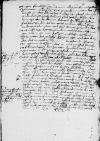Uns ist vorkomen, wie das E(wer) H(erlichkei)t bericht ist, / das der erslagne Matthias (Maciej) (†1536), Guardian of the Franciscan Monastery in Kulm⌊gardianMatthias (Maciej) (†1536), Guardian of the Franciscan Monastery in Kulm⌋ sanct Francisc(us) ordens unser stadt Kulm (Chełmno, Culma, Culmen), town in northern Poland, on the Vistula river, 40 km N of Thorn (Toruń)⌊ColmenKulm (Chełmno, Culma, Culmen), town in northern Poland, on the Vistula river, 40 km N of Thorn (Toruń)⌋ solde zur im kloster bey dem probably Matthias, Abbot of the Cistercian monastery in Koronowo at least from 1536 to 1539 an Abbot of the Cistercian monastery in Koronowo (AT 18, p. 271)⌊apt von der Kronenprobably Matthias, Abbot of the Cistercian monastery in Koronowo at least from 1536 to 1539 an Abbot of the Cistercian monastery in Koronowo (AT 18, p. 271)⌋, / dieweil her messe heth gehalten, vor den altar aus anderer krancheit nidergefallen sein / und bald darnoch gestorben, / das uns nicht wenig vorwundert, / wie leut solchs mugen reden, / so wir des ein entlichen bescheidt haben von des gedochtn(n) klosters apt, / ouch von dem, der des ermorten(n) gardians beichtvater ist gewest. / In seynem leczsten(n), / das er aus grossen smerczen und wetagen, die im von handlen und slegen(n), wie wir E(wer) H(erlichkei)t zuvor cf. Ioannes DANTISCUS to Johann von LUSIAN (LUZJAŃSKI) 1536-04-16 — 1536-04-22, CIDTC IDL 6727, letter lost⌊geschribencf. Ioannes DANTISCUS to Johann von LUSIAN (LUZJAŃSKI) 1536-04-16 — 1536-04-22, CIDTC IDL 6727, letter lost⌋, sein werden erbermiglich vorscheiden ist im ostertage,[1] des wir gutten schein und beweis haben on the margin⌈des wir gutten schein und beweis habendes wir gutten schein und beweis haben on the margin⌉, derweg(en) wir uns nicht voereylet(?), wie Ewer Herlichkeit meynet on the margin in place of crossed-out haben⌈haben wie E(wer) H(erlichkei)t meyn paper damaged⌈[n]n paper damaged⌉et wie Ewer Herlichkeit meynet on the margin in place of crossed-out haben⌉ mit unserm(m) schrey written over ...⌈... illegible⌈...... illegible⌉reyrey written over ...⌉ben an den h(e)rn Andrzej Krzycki (Andreas Cricius) (*1482 – †1537), humanist, neo-Latin poet, diplomat, correspondent of Erasmus of Rotterdam; in 1525 he took part in the negotiations leading to the secularisation of the state of the Teutonic Order; from 1504 Canon of Poznań (from 1511 Scholastic, from 1519 Provost); from 1512 Canon of Cracow, Scholastic of Płock, and secretary to the first wife of Sigismund I Jagiellon, Barbara Zápolya; 1515-1523 royal secretary; 1518-1530 Provost of the Chapter of St. Florian in Cracow; 1522-1525 Bishop of Przemyśl; 1525-1527 Bishop of Poznań; 1527-1535 Bishop of Płock; 1535-1537 Archbishop of Gniezno, Primate of Poland (PSB 15, p.544-549)⌊erzbischoffAndrzej Krzycki (Andreas Cricius) (*1482 – †1537), humanist, neo-Latin poet, diplomat, correspondent of Erasmus of Rotterdam; in 1525 he took part in the negotiations leading to the secularisation of the state of the Teutonic Order; from 1504 Canon of Poznań (from 1511 Scholastic, from 1519 Provost); from 1512 Canon of Cracow, Scholastic of Płock, and secretary to the first wife of Sigismund I Jagiellon, Barbara Zápolya; 1515-1523 royal secretary; 1518-1530 Provost of the Chapter of St. Florian in Cracow; 1522-1525 Bishop of Przemyśl; 1525-1527 Bishop of Poznań; 1527-1535 Bishop of Płock; 1535-1537 Archbishop of Gniezno, Primate of Poland (PSB 15, p.544-549)⌋ / oder mit unsern(n) processen, / die wir derwegen, / von pflicht unsers ampts, haben mussen lossen ausghen. / Das aber E(wer) H(erlichkei)t derweil nymant klagt, / nichts darzu thun wil, / losse wir so bleibn(n). / Wir thun in nicht furdren. / E(wer) H(erlichkei)t weis, was den, die uff freyer ko(nigliche)n on the margin⌈ko(nigliche)nko(nigliche)n on the margin⌉ strossen imant geweldigen nocht rechte geschen sol. / Wir haben, / Got weis, / ni written over un⌈unnini written over un⌉cht gern(n) das darzu gethon, / das wir schuldig. / Wil E(wer) H(erlichkei)t ko(niglich)e strosse nicht rein halten und gerechtigheit uber ubelteter thun von wegen ko(nigliche)n m(ajeste)t und des ampts, das E(wer) H(erlichkei)t befholen, on the margin⌈und gerechtigheit uber ubelteter thun von wegen Sigismund I Jagiellon (Zygmunt I) (*1467 – †1548), King of Poland and Grand Duke of Lithuania (1506-1548); Duke of Głogów (Glogau) (1499-1506), Duke of Opava (1501-1506), Governor of Silesia (1504-1506); son of King Kazimierz IV Jagiellon and Elisabeth of Austria⌊ko(nigliche)n m(ajeste)tSigismund I Jagiellon (Zygmunt I) (*1467 – †1548), King of Poland and Grand Duke of Lithuania (1506-1548); Duke of Głogów (Glogau) (1499-1506), Duke of Opava (1501-1506), Governor of Silesia (1504-1506); son of King Kazimierz IV Jagiellon and Elisabeth of Austria⌋ und des ampts, das E(wer) H(erlichkei)t befholen,und gerechtigheit uber ubelteter thun von wegen ko(nigliche)n m(ajeste)t und des ampts, das E(wer) H(erlichkei)t befholen, on the margin⌉ werden(n) ander den wir daruber klagen. / Dis hab wir E(wer) H(erlichkei)t unser nottorfft noch, / do mit wir nicht geacht wurden, das wir uns an rechte wissenheit und grundt uber imants in unserm stande voreylen solten(n), / gothe dem almechtig(en) befholen nicht mugen berg(en).

 BCz, 244, p. 91
BCz, 244, p. 91